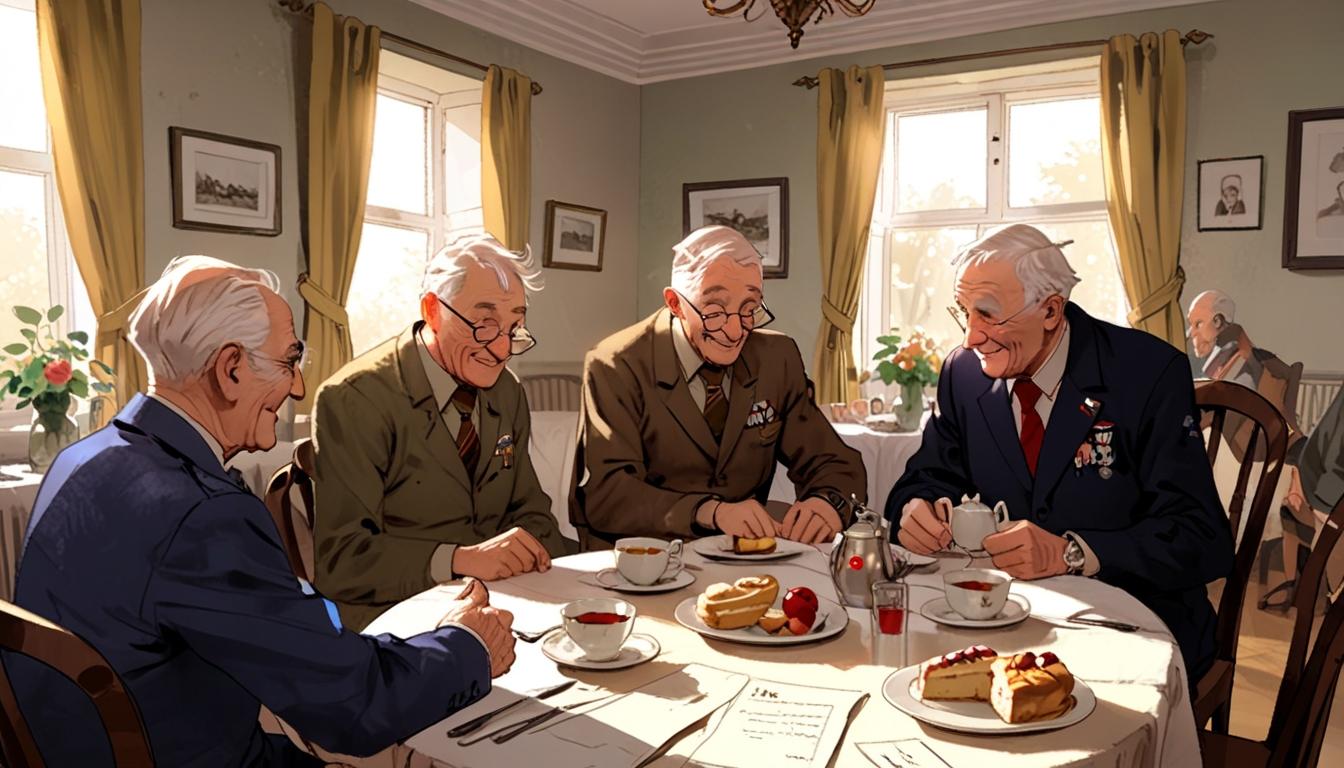In a charming room filled with the aroma of freshly brewed tea and the comforting sight of scones, a group of esteemed RAF veterans gathered recently to share heartfelt memories of their time in the Second World War. Among them was George Dunn, now 102, who had bravely completed 44 operational missions over Nazi Germany in Halifax bombers and Mosquitos. This poignant meeting, organised by the RAF Benevolent Fund, served as a reminder of the sacrifices made by these members of a generation that has profoundly shaped modern Britain.
As the veterans shared laughs, the contrast between their once youthful selves and their now frail bodies was conspicuous. George, with a gleam in his eye, recounted the exhilaration of victory following Germany's surrender, echoing the jubilant atmosphere in Trafalgar Square 80 years ago. He remarked, “The atmosphere was terrific... After six years of conflict, to be able to go out into the open without worrying if there were any jerries about—it was a really lovely day and we were very lucky to have got through our tours.” These gatherings evoke nostalgia, yet they also present an urgent call to remember past lessons as contemporary conflicts unfold in Europe.
Colin Bell, who celebrated his 104th birthday this year, also contributed to the lively discussions. A fellow Mosquito pilot, Colin has not only committed himself to preserving the memories of the war but has actively engaged in fundraising for veterans’ charities. His remarkable fundraising efforts included a daring 17-storey abseil down the Royal London Hospital, aimed at both raising awareness and financial support for the RAF Benevolent Fund and other worthwhile organisations. Colin’s tenacity and spirit culminated in a Guinness World Record— the oldest person to abseil down a building. He raised over £5,000 from the event, embodying a relentless dedication to helping fellow veterans.
In the midst of their memories, the veterans also addressed the pressing issue of national security. Colin articulated a concern that resonates as much today as it did during the 1930s, asserting that the lessons from the past must be heeded to avert future conflicts. "If you haven’t got [security], you have nothing," he emphasised, while calling for increased defence spending to 5%. His steadfast conviction reflects a growing urgency; as tensions rise globally, the need to prepare ensures that younger generations are spared the harrowing experiences of their predecessors.
Another poignant facet of these interactions is the sense of gratitude expressed between the veterans and those who have come to honour their stories. While participants feel privileged to engage with such history, the veterans are often more inclined to express thanks, embodying the humility that characterises their generation. George, for example, recounted his early days of combat, advising anxious new aircrew members to “take a clean pair of underpants with you.” This gentle humour belies the deep-seated fears and stark realities faced in the crucible of war.
The contributions of both George Dunn and Colin Bell extend beyond their military service. Their ongoing support for the RAF Benevolent Fund exemplifies the collective spirit of service that continues to flourish in the UK. This fund has been a stalwart source of support for RAF members and their families for over a century, ensuring that the legacy of those who fought for freedom is both remembered and honoured.
As the audience reflected on the significant milestones of VE Day, the importance of these remembrances resonates more powerfully than ever. In a time when historical lessons risk being overlooked, the voices of veterans like Dunn and Bell serve as critical reminders of resilience, sacrifice, and the vital necessity of remembrance in shaping a safer future.
Reference Map
- Paragraph 1: 1
- Paragraph 2: 1, 4
- Paragraph 3: 2, 3
- Paragraph 4: 1, 6
- Paragraph 5: 1, 4, 5
- Paragraph 6: 1, 4
- Paragraph 7: 1, 4, 5
Source: Noah Wire Services
